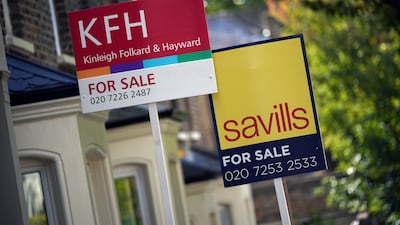House prices in the UK fell month on month for the first time in 15 months in October as part of the reaction to the political uncertainty that loomed over house buyers and financial markets, Nationwide Building Society said.
The 0.9 per cent drop marked the first monthly decline since July 2021 and was the biggest decrease since June 2020, when the UK was in coronavirus lockdown.
October was a month dominated by mortgages, and the fallout from former chancellor Kwasi Kwarteng’s now-disgraced and dropped mini-budget that sent the pound and the markets spiralling down while mortgage rates increased.
People have been forced to pull out of buying a house as mortgages were removed and replaced with higher interest alternatives.
Annual house price growth slowed sharply to 7.2 per cent in October, from 9.5 per cent in September, Nationwide said.
Across the UK, the average house price in October was £268,282 — and the housing market looks likely to slow in the months ahead, the society added.
“The market has undoubtedly been impacted by the turmoil following the mini-budget, which led to a sharp rise in market interest rates," Nationwide chief economist Robert Gardner said.
“Higher borrowing costs have added to stretched housing affordability at a time when household finances are already under pressure from high inflation.”
Alice Haine, personal finance analyst at the Bestinvest investment platform, said the fall in prices was the chill from the October upheaval.
“Britain’s property market is showing clear signs of strain with prices falling almost 1 per cent in October compared to September,” she said.
“It means the pandemic-fuelled, red-hot market that became the norm over the past couple of years — as buyers sought out bigger properties in the race for space, aided by temporary stamp duty incentives to boost the market — is finally at an end with a much more sobering reality going forward."
The outlook for the property market is far from rosy in the near term, Ms Haine said.
A combination of rising rates, falling real wages, a looming recession and sky-high inflation all dampen affordability levels, she said.
The first of the coronavirus lockdowns, which began in March 2020, led to a fall in house sales and prices as people were generally not able to move home.
“On the ground, new buyer inquiries almost dried up as uncertainty about the future direction of mortgage repayments added to cost-of-living concerns," said Jeremy Leaf, a north London estate agent and a former residential chairman of the Royal Institution of Chartered Surveyors (Rics).
“Activity has slowly started to resume as mortgage rates began to stabilise and are now starting to fall. Buyers are negotiating hard as they strive to take advantage of good mortgage offers, while prices continue to be supported by lack of stock.”
Jonathan Hopper, chief executive of Garrington Property Finders consultancy, said: “Sellers who just months ago could take their pick of offers are now biting off the hand of a strong, proceedable buyer — even those asking for a price reduction.”
Tom Bill, head of UK residential research at estate agency Knight Frank, said: “Government stability will help underpin transactions, but we are witnessing a fundamental shift in rates take place after 13 years of ultra-low borrowing costs that will lead to price declines.”


